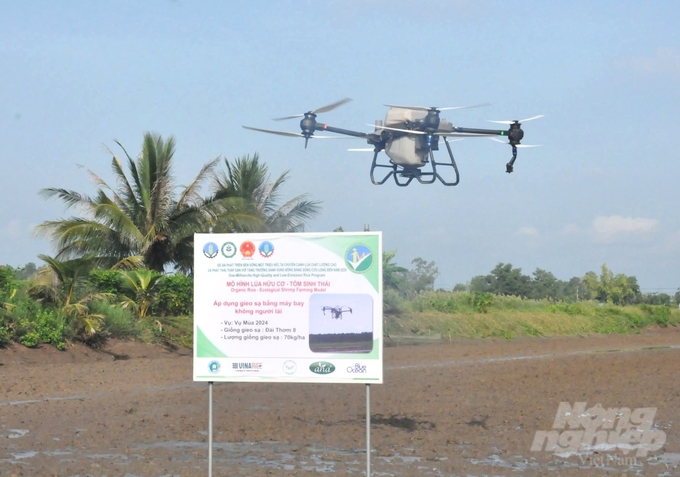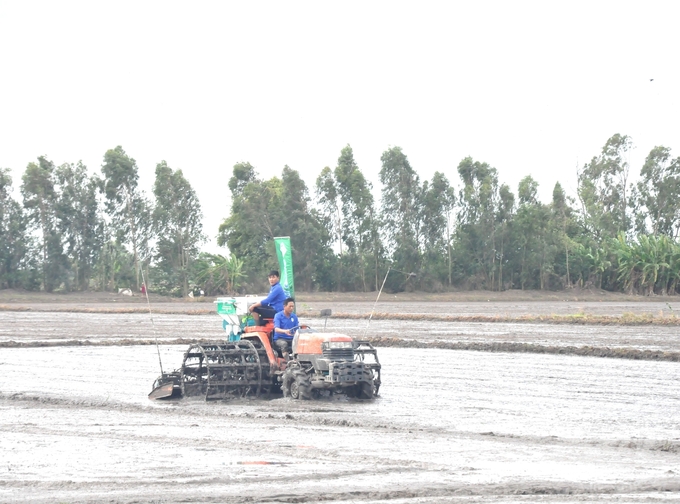May 18, 2025 | 12:44 GMT +7
May 18, 2025 | 12:44 GMT +7
Hotline: 0913.378.918
May 18, 2025 | 12:44 GMT +7
Hotline: 0913.378.918
Kien Giang is the largest rice-producing province in the Mekong Delta, with over 700.000 hectares planted annually, yielding 4.4 to 4.5 million tons per year. Except for Kien Hai district and Phu Quoc city, all other districts and cities produce rice, with Hon Dat district alone producing over 1 million tons annually.

Kien Giang has launched 2 pilot rice fields participating in the 1 million hectares high-quality rice project, with 10 more fields set to be implemented in other localities in the near future. Photo: Trung Chanh.
As part of the Sustainable Development of 1 Million Hectares of High-Quality Rice with Low Emissions Linked to Green Growth in the Mekong Delta Region by 2030, Kien Giang province has registered to implement the project on an area of 200.000 hectares. The province has selected 12 out of 15 districts and cities for the project, including Giang Thanh, Kien Luong, Hon Dat, Tan Hiep, Chau Thanh, Giong Rieng, Go Quao, An Bien, An Minh, U Minh Thuong, Vinh Thuan, and Rach Gia City.
In Kien Giang, two rice fields have been launched with the coordination of the Crop Production Department (Ministry of Agriculture and Rural Development) and the provincial People's Committee. One of these fields, located in a region that produces 2-3 rice crops per year, is implemented at the Phu Hoa Youth Agricultural Service Cooperative (Tan Hoi Commune, Tan Hiep District), with the first crop starting on 50 hectares, involving 25 households.
The next field to be launched is in a region where rice and shrimp are alternated (rice-shrimp), located at the Thanh An Rice-Shrimp Cooperative (Dong Thanh Commune, An Minh District), with an area of 10 hectares and 13 participating households producing "Organic Rice - Ecological Shrimp". This pilot rice-shrimp model is unique, and Kien Giang is the first province in the Mekong Delta to implement it.
Mr. Le Van Dung, Deputy Director of the Kien Giang Agricultural Extension Center, said that to expand the area participating in the 1 million hectares high-quality rice project, as registered by the province, Kien Giang will implement 12 pilot models in 12 districts and cities that grow rice. In addition to the 2 fields that have been launched, the remaining 10 models are planned to be rolled out in the 2024-2025 winter-spring rice season.
A key prerequisite for Kien Giang's participation in the 1 Million Hectares High-Quality Rice Project is that local farmers have already been involved in the Sustainable Agricultural Transformation Project in Vietnam – VnSAT. Tens of thousands of farmers have been trained in technical skills, and around 25.000 hectares of rice are currently maintaining the application of the "3 reductions 3 increases" and "1 must 5 reductions" processes.
According to Mr. Le Van Dung, the Department of Agriculture and Rural Development of Kien Giang has directed several specialized units, including the provincial Agricultural Extension Center, to implement the "1 must, 6 reductions" process (adding one more reduction criterion: reducing greenhouse gas emissions in rice production). At the same time, the province continues to strengthen training for farmers, with a total of 120 training courses planned in 12 localities where pilot models are being launched.

Farmers participating in the 1 Million Hectares High-Quality Rice Project not only receive technical training from agricultural extension services but are also supported in adopting mechanized equipment for various stages of rice production. Photo: Trung Chanh.
The community-based agricultural extension officers will take an active role in directly training farmers, with the focus primarily on the technical processes involved in producing high-quality, low-emission rice in the Mekong Delta region. These training sessions will be based on the guidelines and best practices outlined in the "One million hectares of rice" initiative, a project that has been officially endorsed and issued by the Crop Production Department.
In line with this, Kien Giang Province has also introduced a policy to support cooperatives that are involved in the project by providing financial assistance to help them implement pilot models. The government will cover 50% of the costs for key inputs, including seeds, fertilizers, and specific mechanization tools and equipment such as sensors for monitoring water levels. These tools will be installed on the fields to help implement the innovative irrigation technique known as "alternating wet and dry" (AWD), which optimizes water use while reducing emissions and improving efficiency.
This financial support will be available for three consecutive rice cropping seasons in the pilot fields located in various districts within the province. The overall goal of this initiative is to achieve several key objectives: reducing the amount of rice seed used in planting to under 70 kg per hectare, cutting down the use of chemical fertilizers and pesticides by 30%, reducing irrigation water consumption by 20% compared to traditional farming practices, and ensuring that straw is removed from the fields after harvest.
Translated by Phuong Linh

(VAN) 14 out of 35 domesticated elephants in Dak Lak province have had their living conditions improved, with 11 of them currently participating in the non-riding elephant tourism model.

(VAN) Muong Nhe Nature Reserve hopes that being upgraded to a national park will lay the foundation for forest protection efforts to be carried out in a systematic, modern, and sustainable manner.
/2025/05/16/3923-2-171845_52.jpg)
(VAN) Lower costs, higher yields, and improved soil quality are outstanding benefits that soybeans bring when integrated into the crop rotation system.

(VAN) The 'For a Green National Environment' programme aims to promote a green lifestyle, support businesses in implementing ESG practices, and turn Net Zero commitments into concrete actions.

(VAN) Cold-barn systems efficiently manage environmental and temperature conditions, which aids in the prevention of respiratory diseases in pigs and protects them from the vectors that transmit African swine fevers.

(VAN) To tackle challenges, the project 'Addressing key technical bottlenecks in the grouper supply chain in Vietnam' has been underway since 2024.

(VAN) The project 'Disease-Resilient and Sustainable Cassava Production Systems in the Mekong Region', funded by the Australian Center for International Agricultural Research (ACIAR), is being implemented from 2024 to 2028.